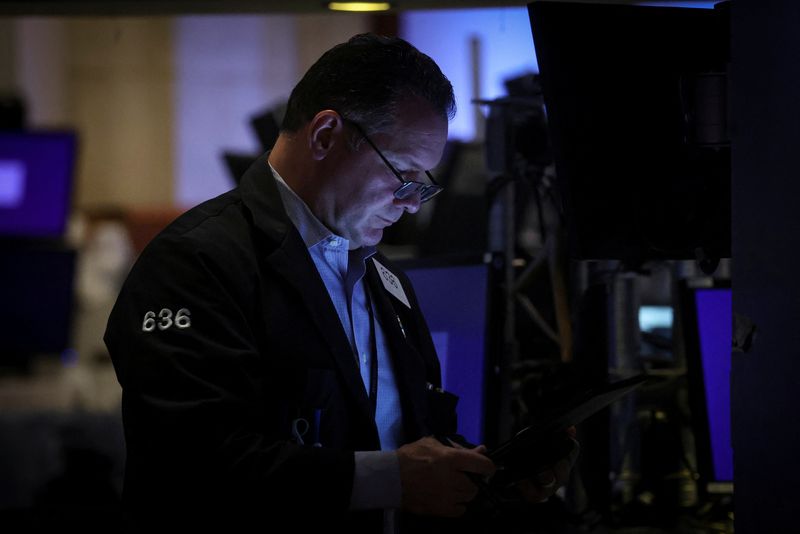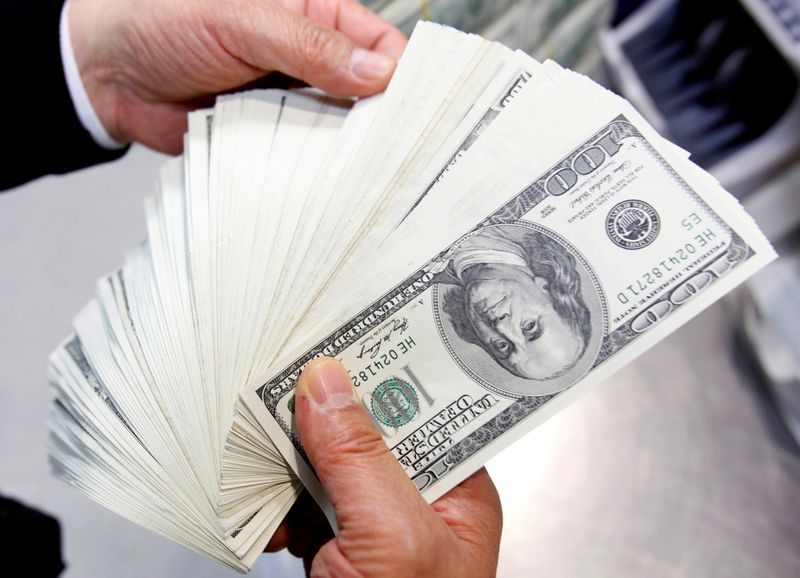By Sinéad Carew and Dhara Ranasinghe
LONDON/NEW YORK (Reuters) - Financial markets made roller-coaster moves on Tuesday with the S&P 500 ending lower, while the dollar gained as jittery investors fled for safety after the Bank of England it would support the UK bond market for just three more days.
Investors had already been grappling with a range of uncertainties ahead of key U.S. inflation and earnings reports, the escalating Russia-Ukraine war, and COVID-19 cases in China.
Earlier in the day the British central bank said it would continue to buy bonds this week. But the mood soured quickly in late afternoon trading after BoE Governor Andrew Bailey told pension fund managers to finish rebalancing their positions by Friday when the bank's emergency support program for the county's fragile bond market would end.
After the comments, Wall Street's stock indexes turned sharply lower, giving back all the gains of a solid rebound that had started around a half hour into the trading day.
The UK news shook up already nervous investors ahead of key U.S. inflation readings Wednesday and Thursday that are expected to prompt the Federal Reserve to keep raising interest rates aggressively, said Michael James, managing director of equity trading at Wedbush Securities in Los Angeles.
"Everyone is on pins and needles everyday at this point, far more worried about something 'bad' causing further downside than worried about missing some 'big up move,'" said James. "We are in a very precarious position right now for next few days."
In particular, the stark BoE deadline made U.S. investors worry that some of the instability in UK markets could make its way to Wall Street, said Randy Frederick, managing director of trading and derivatives for Charles Schwab (NYSE:SCHW) in Austin, Texas.
"What caused the latest downturn was an announcement the Bank of England was going to stop supporting the gilt market in three days. That caused the market to pivot," said Frederick. It's nerves and speculation."
The Dow Jones Industrial Average rose 36.31 points, or 0.12%, to 29,239.19; the S&P 500 lost 23.55 points, or 0.65%, at 3,588.84; and the Nasdaq Composite dropped 115.91 points, or 1.1%, to 10,426.19.
At its peak on Tuesday the S&P had risen as much as 0.8%.
The pan-European STOXX 600 index lost 0.56% and MSCI's gauge of stocks across the globe shed 0.97%. Earlier the MSCI index had fallen as much as 1.5% to 549.19, its lowest level since Oct. 30, 2020.
Emerging market stocks lost 2.28% after hitting an April 2020 low and were set for a near-30% tumble year-to-date, their biggest decline since 2008.
U.S.-led NATO said member states were boosting security as G7 leaders condemned Russia's escalating attacks in Ukraine. Russian missiles pounded Ukraine for a second straight day, after dozens of air raids on Monday that killed 19 people, wounded more than 100 and cut power supplies.
GILT RESPITE
Bonds globally have been sideswiped by the rout in UK government bonds, known as gilts, pushing yields on U.S. Treasuries up sharply.
Bond market trading was volatile with longer-dated U.S. Treasury yields hitting multi-year highs. Benchmark 10-year notes rose 5.8 basis points to yield 3.943%, up from 3.885% late on Friday. [US/]
The U.S. dollar index veered between positive and negative territory but last traded up 0.1% after falling as much as 0.65%. Overall, dollar sentiment has remained positive on worries about rising interest rates and geopolitical tensions and Japan's yen hovered near the level that prompted last month's intervention.
The euro was last up 0.05% at $0.9705.
The Japanese yen weakened 0.06% versus the greenback at 145.81 per dollar, while sterling last traded at $1.0969, down 0.78% on the day. (FRX)
In addition, on Tuesday the International Monetary Fund on Tuesday warned of a disorderly repricing in markets, saying global financial stability risks have increased.
Exacerbating worries was news from China that Shanghai and other cities had seen COVID-19 infections rise, with some local authorities closing schools and entertainment venues.
In commodities oil prices extended Monday's decline, as recession fears and the flare-up in COVID-19 cases in China raised concerns over global demand. [O/R]
U.S. crude settled down 1.95% at $89.35 per barrel and Brent setttled at $94.29, down 1.98% on the day.

Gold trading was volatile after hitting a one-week low.
Spot gold dropped 0.1% to $1,666.19 an ounce. U.S. gold futures gained 0.11% to $1,669.10 an ounce.
